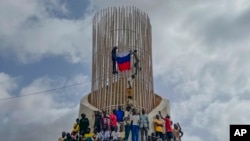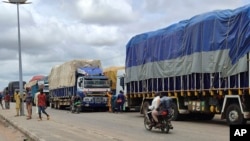At an emergency summit in Abuja, Nigeria, the bloc's President Omar Touray said member states had decided "to order the deployment of the ECOWAS standby force to restore constitutional order in Niger."
An ultimatum to Niger's military junta, which ousted democratically elected President Mohamed Bazoum late last month, expired on Aug. 6, amid other sanctions to try to push for the reinstatement of the Bazoum regime.
The military remains defiant and seems to have garnered the support of young people and even of neighboring Burkina Faso and Mali — two West African states under military rule. Both nations support Niger's military junta, the latter vowing to contribute troops if ECOWAS dared to intervene militarily.
On Tuesday, Nigerian President Bola Ahmed Tinubu's spokesperson, Ajuri Ngelale, told journalists Tinubu and ECOWAS maintain a consensus and prefer "a resolution that was obtained through diplomatic means, through peaceful means, rather than any other ..."
But, the deployment of a "standby force" is in sharp contrast to talks of a diplomatic solution to the impasse by the regional body, bringing into the focus ECOWAS' military invasion of the Gambia in 2016.
Gambia intervention
In 2016, the regional body sent troops to the Gambia led by neighboring Senegal when then longtime ruler Yahya Jammeh refused to accept an electoral defeat to opposition leader Adama Barrow, describing the move by ECOWAS as "an act of war."
At the time, Jammeh threatened to defend his nation against any military intervention and warned that any such move could risk military confrontation, thus leading to destabilization and a threat to regional peace.
Jammeh would later leave Banjul for exile after talks with Guinea’s Alpha Conde, thus averting what could have been a chaotic situation for the tiny West African state.
Kabir Adamu, an Abuja-based security risk management and intelligence analyst, recalled that episode in the Gambia, but said the scenario might play out differently now because the 15-member regional bloc has already suspended three member states — Burkina Faso, Guinea, Mali — over similar military-led coups.
"We know that the military chiefs (within ECOWAS) are ready to carry out a military intervention now," he said as ECOWAS met for deliberations Thursday.
"And so it is not off the record. The possibility remains, but the "circumstances in Niger and the Gambia are very different."
"In the case of Gambia, the majority of the people were not in support of Yahya Jammeh and so it was easy for an external party to come in and do what they did," he noted. "In Niger, the junta has been able to build overwhelming national support riding on anti-French sentiment, and so any external aggression will not be seen from the prism of an unconstitutional act, but rather an act of aggression."
He says a non-aggressive political solution — a diplomatic one — targeted at the Nigerien people would be key for all countries including Nigeria.
The dilemma before the regional bloc, he said suggests that "the future of ECOWAS is being threatened."
"Because four of its member states have threatened to leave and form their own body — it’s likely to be an empty threat — but it’s something to pay attention to."
Invisible forces
Adamu also raised concern about young Nigeriens possessing Russian flags in the aftermath of the coup, noting there’s no evidence of Russia’s involvement in the illegal power grab.
"There are intriguing questions, and I am yet to get answers to … it’s not easy to get foreign flags especially in places like Niger. So how those (Russian) flags were made available in such a speedy time, is an indication that this is organized. Somehow, someone who has the capacity to make those flags available is involved," he said.
"This emphasizes the failure of intelligence in everything that has happened, and there are concerns among ECOWAS heads of state regarding the pushback they will get if they decide to take a military action."
Adib Saani, an Accra-based security and foreign policy analyst, told VOA that " catastrophic sub-regional security" and a devastating economic impact could have informed a rather cautious approach by ECOWAS since its ultimatum to the military junta expired.
He said he doubts the feasibility of a military intervention as a last resort because military invasion has become unpopular with West African citizens.
"But what I am seeing is a lack of cooperation by the Nigerien junta…they seem not to care. They don’t care about what the international community is saying."
"Chad, an ECOWAS member, has stated they want nothing to do with an invasion, and Algeria, an important neighbor to Niger, also said they would not support even the sanctions imposed on Niger," he said.
"Niger shares border with Libya, and there are concerns about the possibility for an inflow of weapons which might trickle down from Nigeria into countries within the coastal areas."
"It’s the protection of personal interests."
Sanctions bite West Africans
Saani said sanctions imposed on Niger are already having ripple effects on consumer goods in Ghana, for example, noting that "sanctions don’t only affect the sanctioned, but the sanctioner as well — everyone loses — that’s why we need to be circumspect in the next line of action."
"A lot of the countries within the region are in shambles. Ghana just had to rely on a $3 billion bailout from the IMF (International Monetary Fund) because the economy was at the brink of collapse," he said.
"As we speak, the price of onion has spiraled out of control, because to a large extent, Ghana relies on onion imports from Niger … we are also hearing that the Nigerian economy will lose over $1 billion because of the sanctions imposed on Niger."
Pre-coup, the price of a bag of onions was about 900 Ghana cedis ($81), but now sells for about 1,600 cedis ($143) and is expected to rise to 3,000 cedis ($268) because of scarcity if the situation does not ease, he said.
Saani also said the heightened misinformation and disinformation that has characterized the coup in Niger — like anti-French sentiment — is making young Africans believe that toppling a legitimate government "is the way to go."
"Soldiers don’t have a magic wand, they don’t change your fortunes overnight like magicians. Rather, things become worse especially in the wake of the sanctions."
"I think there are some other forces who are exploiting the volatile situation to justify the need for them to fill the vacuum, and this is very dangerous for not just the security of Niger, but the wider West African sub-region."



Forum